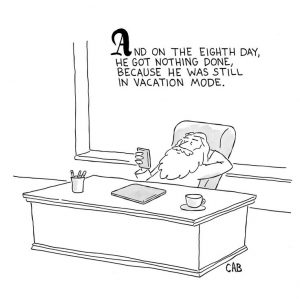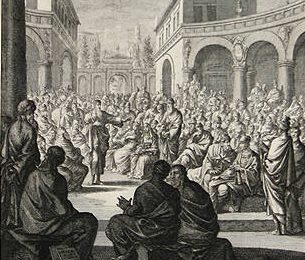Wake Up! You’re Entering The Mission Field
support this website and its creator. Read the full disclaimer here.

A couple of years ago, I read The Master Plan of Evangelism by Robert E. Coleman. My recommendation would be not to binge read it in two days, especially if you won’t have the chance to discuss it with a mature Christian. This is what I did over a weekend cruise, and boy did it mess with my identity! I was convinced that my only purpose on earth was to participate in intentional evangelism and discipleship every minute I was awake. Time spent any other way was a denial of my calling.
Overreaction? Certainly! The author’s intention? I highly doubt it. Thankfully, after further contemplation and discussion with others, I arrived at a more reasonable, balanced understanding of the book. What stuck with me most, however, was what I believe was Coleman’s main point: I should share the Gospel of Jesus Christ with intentionality.
About a year later, my wife and I moved to another state and began attending a new church. At the time, the pastor was walking the congregation through a year-long study covering the characteristics that define an effective Christian. The last characteristic explored was having a personal ministry. Of course, the sermon touched upon the traditional concepts of mission: traveling as a foreign missionary, working for a parachurch organization, serving in soup kitchens and homeless shelters. However, a good portion of the message was spent suggesting less visible and sometimes non-traditional ministry opportunities: distributing care packages to the sick, hobbies and clubs that might offer opportunities for a Christian to share their faith, even a faith-based football pool. The pastor’s point regarding personal ministry was the same as Coleman’s book: find a way to share the Gospel of Jesus Christ with intentionality.
God’s instruction to witness and make disciples (Mat. 28:19; Acts 1:8) is not a new concept to me. However, as I get older and am exposed to the types of teaching I just mentioned, I think more and more about how the Great Commission applies to me. On the surface, it sounds obvious: tell people about Jesus. But for me, as well as many others, it’s not that simple. I am not an outgoing person, and I don’t consider face-to-face discussions to be my strength. This is especially true in a situation where you must think quick — for example, answering questions about God and the Bible.
Because of my introvert nature, it should come as no surprise that I prefer the slower, more contemplative process of writing. As early as grade school, I began expressing myself with the written word. In the late nineties, as the internet was becoming more available to the masses, I started exploring ways to have a creative presence on the web, whether it was on my own sites or those belonging to others. I wrote articles. I spoke on podcasts. I even produced a bit of art. Some of it was Christian. Most of it wasn’t. But it all led up to today.
If you’ve read me for a while, you probably know I have two websites. The first, obviously, is this site, Half Air, which is (as Remember Lizards would say) decidedly Christian. The other is my solo-roleplaying blog, Tev’s Next Idea, where I share my faith in a much more subtle manner. As I’ve studied God’s calling these past couple of years, I have found myself in a tug-o-war: where should I be focusing my time and energy? Half Air always seemed the most likely place. However, Tev’s Next Idea was more fun to write and allowed for more creativity. Of course, there was a third option. Perhaps there was a better use of the talents and abilities God gave me that I hadn’t thought of yet. I was conflicted.
Thankfully, I was smart enough to not struggle with this by myself. I brought it to the One who truly knew the answer: God. As usual, He took His time answering, but eventually He did. One night, earlier this year, in the dark quiet of my room, I clearly sensed Him speaking.
“All those things you are interested in,” He told me, “You can do what you want with them, but that’s not where your ministry needs to be. Right now, you need to be taking care of your wife. And if I’m being honest, which of course I always am, you’re not doing a good job of that right now.”
Okay. It’s time for me to eat a little crow. God was right. Surprise! Deborah, my wife, loves me and lets me know she is grateful to be with me. At times, however, she’s been quick to remind me that I don’t show her the care and affection that I once did. Instead of smiling with pleasure, I sometimes sigh in frustration. Instead of being forgiving, I hold on to my prideful anger. For me, being right sometimes feels more important than being righteous. An apology? I can be far too stubborn for that! To put it simply, I don’t always respect her in a manner consistent with God’s Word. (Col. 3:19; Eph. 5:25; 1 Pet 3:7)
After pondering God’s words for a couple of days, I sat down with Deborah and talked to her about it. I apologized for my behavior and vowed to be a different man. My biggest shortcomings were with my communication and emotions, so I focused on those. I listened to her a lot more and thought before saying something hasty and hurtful. If I was frustrated or overwhelmed, I would do my best to deal with the situation without complaint, talking to Deb calmly only when I felt it was truly important or could be solved. Her favorite change had to be my reduced sighing. After several weeks, once she knew it wasn’t a fluke or false promise, she assured me she could see a difference and appreciated it.
Of course, this article could quickly turn into a fairy tale if I didn’t let you know that not everything is perfect. My pride still shows. I still grumble. Horror of horrors, I even sigh occasionally. In fact, I did something so childish this past Memorial Day that it destroyed what, to that point, had been a wonderful weekend. However, while this is all true, I believe it is occurring a lot less often than it used to and for shorter amounts of time. We are usually talking things out, but when we don’t, I am aware of what I did wrong and consciously do my best to react better next time.
It’s a process and God knows this. If not, then the Bible is a book of lies. The Bible says I will often fail, but when I do, God will still love me. He loves me so much that He sent Jesus to succeed at life for me yet willingly received the punishment I deserve. I know that regardless of how easy or hard it is for me to do “right”, I will always have the Spirit’s help. And when I fail, I don’t have to feel the shame that separates me from God, because He already knows and is ready to forgive.
So, I continue in my personal ministry: my wife. I have good days. I have bad days. But I have the opportunity every day to show her the Gospel of Jesus Christ. And besides us having a better marriage, this ministry is producing some other side benefits.
Jesus told his disciples, “Steep your life in God-reality, God-initiative, God-provisions. Don’t worry about missing out. You’ll find all your everyday human concerns will be met.” (Mat. 6:33 The Message) I can certainly see this starting to happen in my life. Since I’ve shifted my focus to caring for my wife, I am slowly seeing God provide witnessing and discipleship opportunities among some of my other interests.
Earlier this year, I began a Christian book study with a couple of other gentlemen from my church, and we are now reading our second book. I’m continuing to come up with interesting topics to discuss here on Half Air. As for my solo role-playing blog, I am finding more natural ways to include my faith in my stories, discuss it more in my comments, and expand the site to bring in more readers who may not be exposed to the Gospel otherwise.
We often think of mission and ministry as some grand gesture or momentous task. Sometimes it is, but the reality is that our ministry doesn’t begin when we travel overseas, support organizations that spread the Gospel around the world, or walk through the door at our local soup kitchen. It starts long before that. It starts when our feet hit the ground in the morning.
Wake up! God’s mission field begins at your bed!
Like what you are reading? Please consider supporting Half Air by visiting our Support Page and sharing this article.




